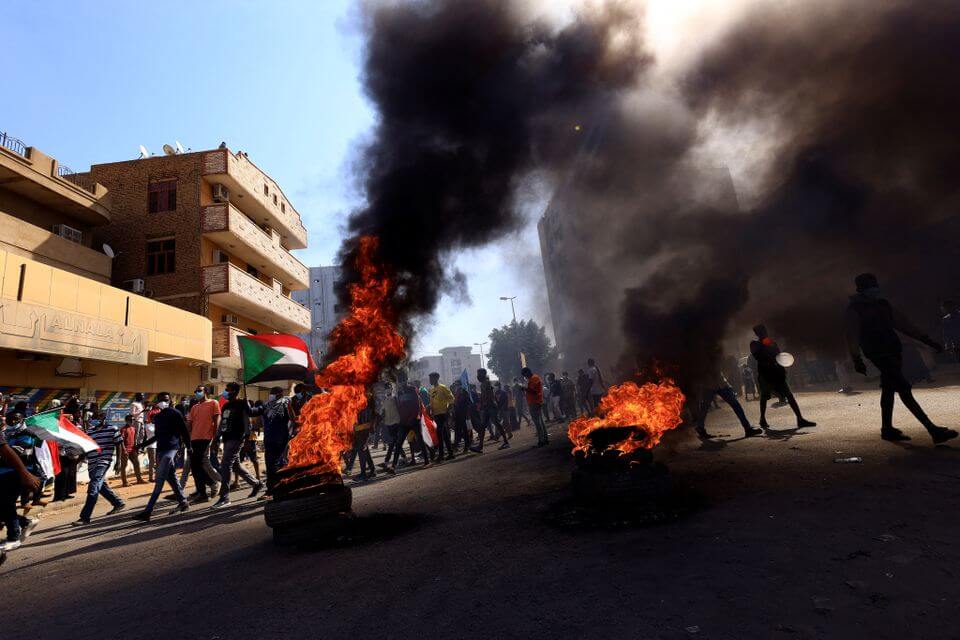Hundreds of thousands of Sudanese citizens took to the streets of Khartoum and elsewhere across the country on Sunday to protest against the October 25 military coup and the subsequent deal to reinstate Prime Minister (PM) Abdalla Hamdok. The protests also marked the third anniversary of the uprising that led to the ouster of former dictator Omar al-Bashir in 2019.
According to Sudan News Agency (SUNA), thousands of citizens gathered across Sudan, including Khartoum, South Darfur, and Gezira, demanding an end to the military rule. SUNA also noted that protestors in the capital had “reached the vicinity” of the presidential palace and called on Sudanese military chief Gen. Abdel Fattah al-Burhan to transfer power to a civilian government.
Video footage circulated online showed protesters waving Sudanese flags and carrying pictures of those killed in the 2019 uprising. Some of the demonstrators managed to reach the gates of the palace and stage a sit-in while chanting slogans against the military.
Security forces reacted harshly by firing tear gas and stun grenades to disperse protesters gathered near the palace. Forces also blocked major roads leading to the airport and the army headquarters, and closed bridges linking Khartoum to other nearby cities.
Also Read: The Historical Irreversibility of Military Coups Points to a Dangerous Outcome in Sudan
Around 123 people were injured as a result of the violence, according to the health ministry. Al Jazeera reported that the security forces’ harsh tactics had very little effect in dispersing protesters and thousands poured into the capital from neighbouring cities. “They say they’re here to voice their demands and show the military that they want a civilian rule and no amount of tear gas or live ammunition will take them away from their demands,” an Al Jazeera reporter noted.
Tensions between civilian and military leaders exploded following a failed coup attempt in September by a military faction loyal to former dictator Bashir. Both camps accused each other of being responsible for the coup and for the lack of progress made by the transitional government in establishing a democratic path forward.
In October, the military ousted the civilian-led transition government in Khartoum in a coup, sparking widespread demonstrations. Gen. Burhan dissolved the government and declared a state of emergency after arresting Prime Minister Abdalla Hamdok. Burhan said the coup was meant to ensure Sudan’s stability, which was jeopardised due to infighting between the military and civilian parties.
#SUDAN
— AFP Photo (@AFPphoto) December 19, 2021
Sudan police fire tear gas at anniversary rally, several wounded.#AFP pic.twitter.com/W3j6Sw80Iv
However, following a deal between Hamdok and Gen. Burhan, the military reinstated Hamdok as the PM a month later and said that it would release all political detainees. The 14-point deal states that the constitution will be amended to ensure that the civilian-military partnership is strengthened and that the transitional government endures.
But the deal was rejected by most citizens, who have said that they will not accept any agreement with the military and demanded an immediate and complete transfer of power to the civilian government. They have also criticised Hamdok for signing the deal and accused him of selling the revolution.
The civilian-military transitional government was established in 2019 following the ouster of longtime dictator Bashir in a military coup after large-scale protests demanding his removal. Following Bashir’s removal, the military signed a power-sharing agreement with the civilian Forces of Freedom and Change coalition. The transitional government was tasked with dismantling the Bashir-era political and financial framework and easing the path towards democratic transition.

